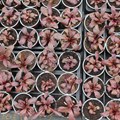The importance of nutrition when growing in peat-free
Prioritising nutrition, particularly when using peat-free compost is crucial. To maximise yields and produce high-quality crops, supplying vital nutrients is key. Peat-free composts typically have lower nutrient levels, requiring careful nutrient management for optimal growth, productivity, and plant health. Here are some expert nutrition tips from our Growing Media and Fertiliser Specialist, Sean Whitworth.
Ensure a balanced nutrient supply
Peat-free composts often have a lower nutrient content compared to peat-based alternatives. Providing plants with appropriate nutrients is crucial to ensure they receive the essential elements necessary for healthy growth and development. Balanced nutrition promotes strong root development, robust foliage, and abundant flowering or fruiting.
Nutrients safeguard sustained plant growth
Nutrients act as fuel for plants, facilitating essential metabolic processes and supporting overall growth. By supplying plants with adequate nutrients in peat-free compost, you help sustain their growth throughout the growing season. This is particularly important for crops that have longer growing periods or require a steady supply of nutrients for continuous production.
Compensating for nutrient limitations
Peat-free composts may inherently lack certain nutrients or have lower nutrient retention capabilities. By supplementing with additional nutrients, you can compensate for these limitations and ensure plants have access to the necessary elements. Nutrient supplementation can be achieved through organic matter amendments, organic fertilisers, or carefully balanced synthetic fertilisers.
Preventing nutrient deficiencies
Inadequate nutrient availability can lead to nutrient deficiencies in plants, affecting their overall health and productivity. Plants growing in peat-free composts might be more prone to nutrient deficiencies due to lower nutrient levels. Supplying nutrients in the right amounts and proportions can help prevent deficiencies, such as nitrogen deficiency causing yellowing leaves or phosphorus deficiency affecting root development.
Enhanced disease resistance and stress tolerance
Proper nutrition strengthens plants' immune systems, making them more resilient to diseases and environmental stresses. When growing in peat-free compost, plants may face additional challenges due to the composition of the medium. Optimal nutrient levels improve a plant's ability to resist diseases, with stand adverse conditions like drought or extreme temperatures, and recover more quickly from various stressors.
By understanding and meeting the specific nutrient requirements of crops grown in peat-free compost, growers can their full potential, achieve desirable yields, maintain consistent quality, and embrace sustainable practices.

